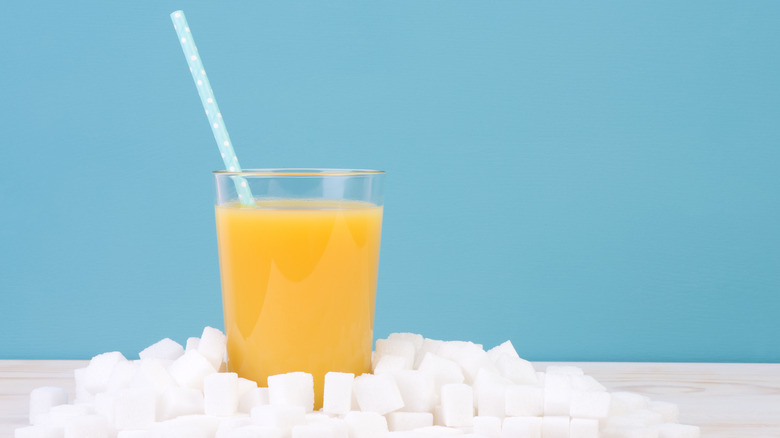Reduced Risk of Kidney Stones
Are There Health Benefits to Drinking Orange Juice?
*Percent Daily Values are based on a 2,000 calorie diet. Your daily values may be higher or lower depending on your calorie needs.
- Vitamin C 207%
- Iron 0%
- Vitamin B6 0%
- Magnesium 0%
- Calcium 3%
- Vitamin D 0%
- Cobalamin 0%
- Vitamin A 10%
Orange juice is enjoyed throughout the world. In fact, surveys reveal that it is the world’s most popular fruit juice. Manufacturers produce around 1.6 billion metric tons of this beverage each year. In addition to buying orange juice in many varieties at grocery stores, you can also squeeze your own orange juice by hand or with an electric juicer.
One popular form of orange juice available in stores is frozen orange juice concentrate. To drink this form of orange juice, you need to mix cold water with the concentrate. This method became widespread during World War II when the United States Dairy Association (USDA) partnered with food scientist Richard Stetson Mores to create a reliable frozen orange juice concentrate process.
Orange juice contains many beneficial nutrients — most notably Vitamin C — but you should consider the amount of sugar in each serving. You may want to limit your intake or choose a 100 percent fruit juice version that doesn’t contain added sugar.
Nutrition Information
One cup of fresh orange juice contains:
- Calories: 112
- Protein: 2 grams
- Fat: 0 grams
- Carbohydrates: 26 grams
- Fiber: 0 grams
- Sugar: 21 grams
Orange juice is a good source of:
Orange juice with pulp is a good source of fiber. Studies have shown that fiber helps the body maintain digestive health and may lower your risk of conditions like diabetes, heart disease, and some types of cancer.
Potential Health Benefits of Orange Juice
Orange juice is nutritious, but it’s important to limit your consumption because of its high sugar content.
Research has found that drinking orange juice in moderation can have many potential health benefits:
Orange juice is an excellent source of Vitamin C — one cup contains twice the daily recommended value. Vitamin C supports your immune system and may be effective in fighting against the common cold.
Birth Defect Risk Reduction
The folate in orange juice supports healthy fetal development. The Centers for Disease Control (CDC) suggests that pregnant women take in at least 400 mcg of folate or folic acid each day to prevent neural tube defects.
Reduced Risk of Kidney Stones
Orange juice contains a high level of potassium citrate. This nutrient binds to the calcium in urine, creating an environment where kidney stones are less likely to develop.
Potential Risks of Orange Juice Consumption
Orange juice is an excellent source of several vitamins and minerals. However, like all juices, orange juice contains a significant amount of sugar, which can increase blood sugar levels. Increased blood sugar can be dangerous for people who experience hypoglycemic symptoms like dizziness when consuming sugar too quickly.
Weight Control
The high concentration of sugar in orange juice, especially in orange juice that contains added sugar, makes it a high calorie beverage. For people following a restricted calorie intake to lose weight, low calorie, dense foods are more effective.
Healthier Alternatives
Look for orange juice that does not contain added sugar. Also consider high-pulp orange juice, which contains more healthy fiber. You can even find orange juice that has been fortified with extra calcium, as well as vitamin D, which does not naturally occur in orange juice.
Show Sources
The American Journal of Clinical Nutrition: “Fortification of orange juice with vitamin D2 or vitamin D3 is as effective as an oral supplement in maintaining vitamin D status in adults.”
CDC: “Folic Acid Helps Prevent Some Birth Defects.”
Clinical Journal of the American Society of Nephrology: “Soda and Other Beverages and the Risk of Kidney Stones.”
ESHA Research, Inc., Salem, Oregon: “Orange Juice.”
Harvard Health Publishing: “Can Vitamin C Prevent a Cold?”
Mayo Clinic: “Dietary fiber: Essential for a healthy diet.”
Statista: “Orange juice production volume worldwide from 2014/2015 to 2019/2020 (in million metric tons).”
Time: “The Surprisingly Link Between World War II and Frozen Orange Juice.”
University of Michigan, University Health Service: “Weight Reduction.”
West Texas A&M: “Is fruit juice healthier than whole fruit?”
Is Orange Juice Good for You? Here’s What Dietitians Say
Nothing says “breakfast” like a glass of orange juice. But when it comes to nutrition, does your cup of sunshine fall short?
Sara Haas Headshot
Sara Haas, RDN Reviewed by Dietitian Maria Laura Haddad-Garcia Updated November 11, 2022
Reviewed by Dietitian Maria Laura Haddad-Garcia
Each product we feature has been independently selected and reviewed by our editorial team. If you make a purchase using the links included, we may earn commission.
Advertisement
Orange juice is sweet and downright delicious. Fresh-squeezed or straight from the carton, it’s a beloved beverage enjoyed beyond breakfast. But is orange juice good for you? Juice is often deemed as the less-nutritious option compared to eating whole fruit. But why? Let’s take a closer look at the nutritional profile of orange juice and see what the experts have to say.
Related: 6 Foods with More Vitamin C Than an Orange
Orange Juice Nutrition
Here is the nutritional information for one 8-ounce serving of orange juice, per the USDA:
- Calories: 110
- Protein: 2 grams
- Fat: 0 grams
- Carbohydrates: 27 grams
- Sugar: 20 grams
- Fiber: 1 gram
- Sodium 9.6 grams
- Calcium: 41 milligrams
- Vitamin C: 60 milligrams
This nutrition information may vary depending on the manufacturer.
Orange juice on a designed background of question marks
Credit: Getty Images / Pineapple Studio / Savany
The Healthiest Orange Juice to Buy
The best orange juice option when it comes to store-bought juice is fortified, 100% orange juice. It has no added sugar and has been supplemented with calcium and Vitamin D—two nutrients Americans tend to fall short on. Fresh-squeezed is also a great option, but often more expensive when compared to packaged varieties. Fresh-squeezed juices also don’t have the same amount of calcium and Vitamin D as their fortified counterparts.
As for how much orange juice you should be drinking, healthcare professionals, including registered dietitians, recommend that adults consume no more than 1 cup of 100% fruit juice each day. Why? We want to encourage people to eat mostly whole fruits because they offer additional nutritional benefits. And even though the sugar in 100% juice is naturally occurring, keeping your juice habit to 1 cup a day keeps calories in check and helps prevent blood sugar spikes.
If you’re looking for a little boost of fiber, consider choosing varieties that contain pulp—they’ll supply around 0.5 to 1 gram of fiber per serving. It’s not much, but it counts toward the recommended goal of 25 to 34 grams of fiber per day, which is what the 2020-2025 Dietary Guidelines for Americans (DGA) recommend.
What about orange juice concentrate? It’s a convenient choice, but if you choose to drink concentrate, read the labels and avoid anything that says, “beverage, punch or cocktail.” These terms likely mean it only contains a small percentage of real orange juice and has added sugar mixed in—and possibly colorings—to achieve the flavor and color of real orange juice. Instead, look for fortified, 100% orange juice concentrate. The only ingredients listed should be 100% orange juice, as well as a source of calcium and vitamin D. And, remember, this is a concentrated product, so prepare the orange juice following the package directions, adding the recommended amount of water for dilution.
Health Benefits of Orange Juice
It Provides a Full Serving of Fruit
The Dietary Guidelines for Americans recommends that most females and males consume 1½ to 2½ cups of fruit each day. According to MyPlate, which is based on the DGA, 1 cup of 100% juice provides one serving of fruit. That means 1 cup of orange juice at breakfast helps fulfill about half of your daily fruit needs. Just keep in mind that the type of orange juice you choose matters, as does the amount.
It Can Help Support a Healthy Immune System
“An 8-ounce glass of fortified 100% orange juice is a delicious and easy way to get more than 100% of your daily needs of vitamin C and 15% for vitamin D,” says Jerlyn Jones, M.S., M.P.A., RDN, a registered dietitian nutritionist and spokesperson for the Academy of Nutrition and Dietetics.
According to the National Institutes of Health (NIH), both vitamins C and D help support a healthy immune system. “Vitamin C strengthens our immune system by protecting our cells, and vitamin D plays an important role in regulating our immune responses and may help immune cells fight off bacteria and viruses,” explains Jones. Orange juice also supplies other important nutrients such as potassium and folate, which promote heart health, per the NIH, as well as powerful antioxidants, including carotenoids and flavonoids. And a 2022 review in Advances in Nutrition suggests that 100% orange juice might also help reduce inflammation within the body; inflammation is responsible for many chronic health conditions, including heart disease, cancer and diabetes.
It’s a Kid-Friendly Way to Get Nutrients
When it comes to orange juice and kids, you may be wondering if juice is a suitable beverage for children. The increasing availability of foods and beverages with high amounts of added sugars has been a contributor to the increased prevalence of overweight and obesity in children. Whole, nutritious foods are often replaced when these foods and beverages are over-consumed. This translates to fewer nutritive calories and more nonnutritive calories.
But what about juice? In a 2021 longitudinal study published in Public Health Nutrition, researchers found that children (ages 9 to 16) who drank 100% orange juice did not appear to have an increased risk of having excess weight or obesity. Moreover, the children who drank more orange juice also appeared to have healthier diets and lifestyle habits.
Marina Chaparro, M.S., RD, a pediatric dietitian and author of Diabetes & Pregnancy, agrees that 100% OJ can complement a child’s nutrition. Just keep the amount in mind. “Keep portions small, as growing bodies need a vast array of nutrients from a variety of different foods,” says Chaparro.
This is consistent with the 2017 guidelines the American Academy of Pediatrics (AAP) set forth, which no longer recommends juice for any child under the age of 1 year.
The AAP recommends:
- Under 1: no juice
- Ages 1 to 3: no more than 4 ounces (1/2 cup) per day
- Ages 4 to 6: no more than 4 to 6 ounces (1/2 to 3/4 cup) per day
- Ages 7 to 18: no more than 8 ounces (1 cup) per day
The Bottom Line
Orange juice has health benefits, but not all juices are created equal. At the store, read the labels and choose fortified, 100% orange juice. Avoid juice beverages, juice cocktails and juice punch, as they are basically sugar water and typically contain only a small fraction of real juice. And like all good things, enjoy your glass of sunshine—in moderation.
When You Drink Orange Juice Every Day, This Is What Happens To Your Body

Many people drink orange juice every day, along with some morning eggs and toast. And they feel good knowing that their breakfast drink of choice is loaded with vitamins, nutrients, and antioxidants, as noted by Healthline. Many may assume that, since this refreshing citrus drink is made by squeezing oranges, it has got to be naturally good for you, right? Well, that is often the subject of scientific scrutiny, since, yes, it boasts body-boosting benefits. but also has an awfully high sugar content, as per Healthline.
So what is the ultimate verdict? Is your beloved orange juice actually good for you or should you skip that daily dose of brightly colored goodness? We are breaking down the plentiful health benefits and sharing a couple of the not-so-great consequences of consuming OJ on the regular, so you can make an informed decision for yourself. This is what happens to your body when you drink orange juice every day.
When you drink orange juice every day, you’re getting a daily dose of immunity-boosting vitamin C

There is a reason we load up on OJ during cold and flu season, sometimes choosing to drink orange juice every day; the sweet citrus drink is chock full of immunity-boosting vitamin C, an “essential vitamin” that our bodies are unable to make naturally on their own, according to Healthline. The daily suggested dose of vitamin C is between 75 and 90 milligrams, and a six to eight ounce glass of 100 percent OJ offers about 93 milligrams on its own, per Good Housekeeping. Plus, it tastes good!
But how does the vitamin C in orange juice work to strengthen our bodies and keep us healthy? In short, vitamin C helps to promote “the production of white blood cells known as lymphocytes and phagocytes, which help protect the body against infection,” and then it continues to ensure that these cells function properly, according to Healthline. The website even cites research linking vitamin C to reduced “healing time,” and indicates that a diet low in vitamin C can lead to “poor health outcomes.”
You might gain weight if you drink orange juice every day

Drinking orange juice is certainly pleasing on the tastebuds, but consuming excessive amounts of the breakfast drink could actually cause you to pack on extra pounds. A eight-ounce cup of the drink boasts about 110 calories. The problem? Drinking calories via high sugar drinks won’t satiate your hunger, especially if you choose a juice without fiber-rich, filling pulp — so you likely won’t eat less, and you will take in more calories than if you had sipped water instead, per Healthline.
Furthermore, research cited by Healthline indicates that one daily glass of 100 percent fruit juice, such as orange juice, can cause a 0.5 to 0.75 pound gain in weight over the course of four years. This might not seem like much, but think of the weighty consequences if you happen to drink more than that one single serving each day.
There are a few ways to help reduce the risk of weight gain if you drink orange juice every day, as noted by Healthline. You can cut calories by diluting your orange juice with water and watching your portions. Additionally, consider drinking an OJ with pulp so that you can benefit from the filling effects of fiber.
Drinking orange juice every day could increase your risk of getting type 2 diabetes

When it comes to the risk ratio for developing type 2 diabetes, “sugar-sweetened fruit juice” is a big no-no, while 100 percent fruit juice is not considered to be as big of a culprit, according to research. Still, you shouldn’t freely chug OJ without regard for your sugar intake. A 2013 study cited by Diabetes.co.uk indicated that having three servings of fruit juice a week caused an eight percent increase in one’s risk of getting diabetes. Nevertheless, if you want to actively reduce your diabetes risk, choose orange juice with pulp in it. According to Livestrong, “The fiber in the pulp of orange juice also helps to keep blood glucose and insulin levels stable.”
Still, since the sugar in juices can dramatically spike your blood sugar levels, as per Diabetes.co.uk, if you suffer from type 2 diabetes, you shouldn’t regularly drink it. But you can treat yourself to the occasional glass of 100 percent fruit juice — just “remember to count the carbs as part of your overall meal, and plan for the blood sugar spike the juice might cause,” Katherine Basbaum, a registered dietician with the University of Virginia Health System, told Everyday Health. Additionally, read the label and ensure you choose an orange juice without added sugar, as noted by Healthline.
You’ll get the benefits of antioxidants if you drink orange juice every day

Want to help your body with the naturally protective powers of antioxidants? Chug that big, tall glass of orange juice — it is loaded with “antioxidants like flavonoids, carotenoids, and ascorbic acid,” according to Healthline. Since OJ is a popular fruit juice of choice in the United States, it is no surprise that research found that orange juice is one of the main sources of antioxidants — along with other popular foods and drinks like berries, teas, and wine.
But what are the antioxidants in your orange juice actually doing for your body on a cellular level? In essence, these antioxidants offer protection against oxidative damage that lead to certain ailments such as heart disease and cancer, according to a 2008 study published in the Journal of Agricultural and Food Chemistry. Heck, they even help to fight aging. Now that is a good reason to drink orange juice every day — cheers to a healthier, happier you!
Drinking orange juice every day could help prevent kidney stones

If you regularly suffer from kidney stones, you might benefit from choosing to drink orange juice every day. That is because studies have demonstrated that citrus juices — and orange juice, in particular, “may help prevent recurrent kidney stones,” as noted by WebMD.
Kidney stones can form when minerals build up in your urine, eventually crystalizing, per the site. The citrate in orange juice naturally decreases the acidity in urine, preventing the formation of these stones in the first place. “Orange juice could potentially play an important role in the management of kidney stone disease and may be considered an option for patients who are intolerant of potassium citrate,” Dr. Clarita Odvina, assistant professor of internal medicine at the University of Texas Southwestern Medical Center, told WebMD.
So if you would rather skip the stones than pass them (and who wouldn’t?), pour yourself a glass of orange juice.
If you drink orange juice every day, you may get the bone-building calcium and vitamin D you need

If you check the refrigerated shelves of your grocery store, you will find lots of orange juice products — some fortified with vitamin D and calcium. Essentially, you can choose to get OJ with these added benefits.
We primarily get vitamin D from sunlight, with food being a secondary source, according to Medical News Today. Vitamin D is required by the body to absorb calcium which contributes to bone strength and health, as noted by Mayo Clinic. Basically, vitamin D and calcium go in go hand in hand, and Mayo Clinic suggests “that calcium, along with vitamin D, may have benefits beyond bone health: perhaps protecting against cancer, diabetes and high blood pressure.” The potential benefits to the body make the supermarket purchase of fortified orange juice a no-brainer.
Curious as to what really happens when you’re low on vitamin D? Changes in mood, body aches, and brain fog are just some of the things you could experience.
If you drink orange juice every day, your heart will thank you

Hesperidin is one of the amazing antioxidants in orange juice working hard for you and your bodily functions. According to WebMD, the ingredient, which is a “a plant-based compound called a flavonoid,” can help “[improve] blood vessel function,” reducing your chance of suffering from clogged arteries, a stroke, and heart disease in general, per the site.
As reported by WebMD, a study involving 24 males at risk for cardiovascular problems indicated that when they drank 500 milliliters of orange juice or a different drink fortified with hesperidin every day for a whole month, they experienced improved endothelial function and a reduction in diastolic blood pressure. However, the men did not get these heart-happy body-boosting benefits when they drank a beverage without hesperidin in it.
So if you really “heart” your heart health, consider making the decision to drink orange juice every day. Your ticker may thank you.
Drinking orange juice every day will reduce illness-causing inflammation

Inflammation has been associated with chronic illness and metabolic diseases like rheumatoid arthritis, asthma, Crohn’s disease, and even certain cancers, according to Medical News Today. Many foods can help reduce illness-causing inflammation, such as fruits, vegetables, beans, fish, and nuts, while other dietary additions — like sweet desserts, highly processed meats, dairy products, and other greasy high-fat foods – can worsen the issue, according to WebMD. Luckily, at least one study published in Plant Foods for Human Nutrition has indicated that orange juice is one option that seems to reduce inflammation, making it a great potential addition to your daily diet. While more research is needed, many scientists agree that it might be worth drinking “for prevention and treatment of chronic diseases.”
Additionally, as noted by Everyday Health, citrus fruits are chock full of vitamin C, which is “necessary for the synthesis of collagen,” helping to strengthen and mend “blood vessels, tendons, ligaments, and bone,” making it an extremely great dietary addition for those with osteoarthritis.
If you drink orange juice every day, you might experience uncomfortable heartburn

Burn, baby, burn. If you tend to suffer from heartburn, you might want to steer clear of that morning glass of orange juice. The citrus fruit juice can cause some uncomfortable esophageal and digestive symptoms, as noted by Healthline. In fact, a 1995 study published in Gastroenterology involving hundreds of people who regularly suffer from heartburn, found that 73 percent of participants reported experiencing symptoms after having having a glass of orange juice or grapefruit juice (via Healthline). The research points to the high level of acidity in this drink as the likely culprit.
And, while OJ is a definitive heartburn offender, it is worth nothing that other popular drinks, including coffee and wine, were found to be common triggers as well. Basically, you might have to give up all of your favorite morning and evening drinks to quell the fire.
If you’re pregnant, drinking orange juice every day will benefit your baby

If you have a bun in the oven, you might want to serve up some orange juice. The citrus drink is loaded with folic acid, an essential type of vitamin B9 that is not stored naturally in the body and is consumed via diet, according to the American Pregnancy Association. Folic acid is especially important during pregnancy as it is “used to make the extra blood your body needs,” during that nine-month period. It also helps to prevent neural defects from happening to the baby in the first three months of gestation, as per the American Pregnancy Association.
It’s no surprise that the Centers for Disease Control recommends that expecting moms take in 400 micrograms of folic acid each day (usually via a doctor-recommended prenatal vitamin) in addition to consuming foods that contain naturally occurring folate. According to the Florida Department of Citrus, an 8-ounce glass of 100 percent orange juice boasts 15 percent of one’s daily recommended dose of folate. Do not forget, Mom — you are drinking orange juice for two now!
But while 100 percent orange juice is fine in moderation and good for your daily folate intake, maybe skip out on the Sunny D — it’s one of a couple juices you shouldn’t be drinking.
If you have a cold or virus, drinking orange juice every day won’t help you get healthier faster

Yes, orange juice has immunity-building vitamin C, but can taking it at the start of a cold or virus help quell an illness? Well, most studies have found that it won’t really do much as an acute remedy. Dr. Bruce Bistrian of Beth Isreal Deaconess Medical Center told the Harvard Health Letter “that vitamin C is only marginally beneficial when it comes to the common cold.”
Still, getting your daily dose of vitamin C when you are not feeling in tip-top shape via orange juice or supplement certainly won’t hurt. In fact, a review of 29 trials cited by Harvard did find that consuming at least 200 milligrams of vitamin C daily seemed to “reduce the duration of cold symptoms” by about one day. So go ahead and drink up that OJ in between sniffles, but take note that choosing to drink orange juice every day could be more effective, per Harvard Health Letter.
Drinking orange juice every day could give you a glowing complexion

Orange juice might perk you up in the morning and give your complexion a natural boost — a win-win-win for your body, mind, and face! According to Livestrong, the vitamin C in your daily glass is an “essential ingredient” in collagen and elastin, both of which are key to obtaining beautiful, plump skin. Plus, as an antioxidant, the nutrient fights damage from free radicals that can otherwise “increase inflammation that can make acne worse,” per the site.
Still, you might find it more effective to take a vitamin C supplement instead. Dermatologist Nicholas Perricone told Livestrong that there is an insufficient amount of the nutrient in one serving of orange juice to “maintain tissue levels of vitamin C.” The Florida Department of Citrus, however, claims that your daily glass of orange juice will hydrate your skin and give you “colorful plant pigments called carotenoids” which could help you “maintain a youthful glow.” So, if you drink orange juice every day, you could help keep your skin in top shape!
Drinking orange juice every day is bad for your teeth

You might hurt your smile if you drink orange juice every day. The high acid in OJ can weaken the enamel, according to a 2009 study by the University of Rochester Medical Center. This day-to-day erosion can be a catalyst for more widespread tooth decay. What’s more, drinks that are both high in sugar and acid pack a doubly harmful punch, per Healthline.
“It’s potentially a very serious problem for people who drink sodas and fruit juices daily,” Dr. YanFang Ren, DDS, of the Eastman Institute told Science Daily. He wants patients to know that sipping orange juice slowly over a longer period of time compounds the potential erosion. He suggests drinking fruit juice and other acidic beverages in one swift sitting to minimize exposure. Essentially, avoid bathing your teeth in orange juice and other drinks.
Another helpful tip to benefit your pearly whites? Dr. Keith Arbeitman told Healthline that he advises “diluting fruit juice with about 50 percent water” to decrease the risk of tooth damage.
Drinking orange juice every day could improve your cholesterol

Suffering from high cholesterol? You might need to make significant changes to your daily diet. One easy (and delicious) change is to add a glass of orange juice to your morning routine.
A 2013 study in Lipids in Health and Disease found that people who drink orange juice regularly and consistently have lower levels of total cholesterol and a reduction in their LDL level (or what’s considered to be bad cholesterol). As per Livestrong, orange juice has the antioxidants flavonoids that can help protect the body from cardiac problems and even decrease blood pressure. What is more, as noted by Healthline, other studies have shown that orange juice can increase your HDL (or what’s regarded as your “good” cholesterol).
Basically, orange juice can help you balance out that good and bad cholesterol ratio and reduce your overall risk of suffering from a cardiac event.
You’ll consume more potassium

Potassium is an essential mineral, according to the Harvard T.H. Chan School of Public Health. This is because potassium works together with sodium to maintain optimal fluid balance within the body, with potassium regulating intra-cellular fluid balance and sodium regulating fluid balance outside cells, which may be helpful to think of as circulatory fluid (via Nursing Times). Since our bodies are comprised of 55-78% fluids (via U.S. Geological Survey), fluid balance is critical. Among other things, fluid balance keeps muscles (including the heart) contracting effectively and blood pumping at optimal pressure. In fact, in adults with blood pressure just above the norm, increasing potassium intake is often recommended as a first step toward optimal blood pressure (via the American Heart Association). In addition, potassium may help support optimal bone mineral density by helping to reduce calcium loss (via a 2008-2011 study in Osteoporosis International).
According to the AHA, recommended daily potassium intake is 4,700 mg per day — which can be a challenge for many of us because the primary sources of potassium are fruits and vegetables, and many of us don’t get enough of these in our daily diets, per The New York Times. Fortunately, orange juice is a rich, drinkable source of potassium. An 8-ounce serving delivers nearly 500 mg in one fell swoop, which is more than what you’ll get in a banana (via Healthline), which is often thought of as the go-to fruit for a quick hit of potassium.
You could lower your cholesterol

Since orange juice contains no cholesterol or fat whatsoever (via the USDA’s FoodData Central), it can make for an ideal pick-me-up that won’t increase your daily cholesterol and fat intake — and drinking orange juice daily and over the long-term may help you to lower your cholesterol levels, according to a 2013 study published in Lipids in Health and Disease. Specifically, in a sample consisting of 103 men and 26 women (all aged 18 to 65), those who were habitual, long-term drinkers of orange juice (defined by the study as self-reportedly drinking two cups per day for one year) were found to have lower levels of LDL (the bad cholesterol) a better ratio of bad to good cholesterol, and lower total cholesterol, compared with those who did not drink orange juice. Perhaps even more importantly, this was true in people who began with normal and moderately high cholesterol levels.
Maintaining healthy cholesterol levels is essential to maintaining heart health, via American Heart Association. On the other hand, excess sugar consumption can have the opposite effect, according to Harvard Health. However, a 2016 study published in Food & Function addressed this issue. It demonstrated that the sugar in orange juice lowered cholesterol in overweight men with high cholesterol and helped lower their cholesterol without contributing to weight gain or high blood sugar.
Your memory and cognition could improve

Orange juice is rich in antioxidants that can neutralize free radicals produced or introduced into our bodies, which are associated with cellular deterioration, per Medical News Today and Healthline. In addition, orange juice is particularly rich in flavanones, a type of flavonoid responsible for lending orange juice, as well as other citrus juices and fruits, a slight bitterness that balances the inherent sweetness and tang, according to a 2016 paper published in the Journal of Nutritional Science. More relevantly, however, they also make orange juice notably supportive of brain health, according to the Alzheimer’s Drug Discovery Foundation, reporting on a 2015 study published in the American Journal of Clinical Nutrition.
In that study, 37 healthy older adults were divided into two groups. One group drank orange juice — two cups daily — while the other drank a placebo that tasted like orange juice and contained the same number of calories. Memory and cognition were assessed in the members of both groups as a way of measuring cognitive function, both at the outset of the study and after the eight-week study period, and those in the orange juice group demonstrated an 8% improvement on average. The study authors considered this a promising indication that flavanone consumption, including in orange juice, may help “attenuate cognitive decline in aging.” As the ADDF has pointed out, more research is needed, including whether the sugar content in orange juice could undermine orange juice’s potential brain benefits.
If you have Parkinson’s disease, your daily glass of OJ could extend your life

A 2016 paper published in the Journal of Nutritional Science has suggested that the same flavonoid antioxidants that can help attenuate the memory and cognitive decline that is a normal part of aging (per Alzheimer’s Drug Discovery Foundation) may also attenuate some levels of the neurodegeneration that is associated with both Alzheimer’s and Parkinson’s diseases. Recently, January 2022 study published in Neurology validated that hypothesis concerning Parkinson’s disease. Moreover, it went a step further by demonstrating that the neuroprotective effects of flavonoids may help extend the life expectancy of people who have been diagnosed with Parkinson’s.
The research involved a large sample of well over a thousand men and women (500 women and 652 men) who had recently been diagnosed with Parkinson’s disease. All the subjects had already been participating in a long-term prospective study to identify the risk factors for several diseases. As part of that prospective study, the subjects answered questionnaires at regular intervals that illuminated, among other things, their intake of various foods, including, specifically, flavonoid-rich foods such as orange juice. Using that information plus mortality data from the National Death Index and state vital statistics records to determine which subjects were still alive, the researchers found that the Parkinson’s disease patients who ate more flavonoid-rich foods tended to have a lower risk of mortality.
Orange juice drinkers may have a healthier overall diet

Given OJ’s associated health benefits —its sugar content and related risk of weight gain and diabetes notwithstanding — compelling scientific evidence appears to suggest that those who regularly consume orange juice are more likely to have a better diet overall, at least in the formative years between ages of 2 and 18, according to a 2011 study published in Nutrition Research.
For that study, the researchers followed the health data on 7,250 children ages 2-19 who were already participating in the National Health and Nutrition Examination Survey, which compiled data on children’s eating habits, nutritional status, weight, and well as their overall diet quality. Just over 26% of the children were orange juice drinkers, with an average intake of over one cup per day. Researchers found that the orange juice drinkers were more likely to meet their daily requirements for Vitamins A and C and folate. In addition, their Healthy Eating Index was significantly higher and included more fruit. Although orange juice drinkers tended to take in more calories daily, they didn’t weigh more or had higher BMI than those who didn’t. While this doesn’t prove that drinking orange juice inevitably leads to a healthier diet without weight gain or increased BMI, the correlation is powerful and led the researchers to recommend encouraging orange juice consumption in children.






